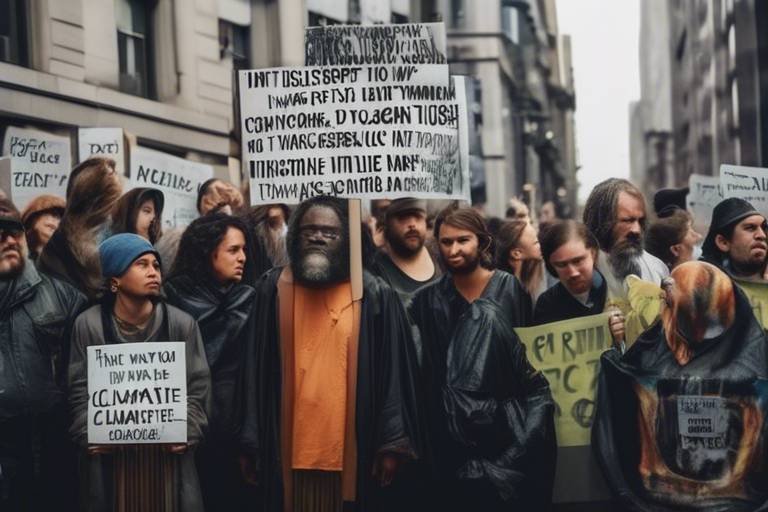Philosophy and the Politics of Climate Justice
Climate justice is not just a buzzword; it’s a crucial framework that intertwines ethical considerations with political action. As we navigate through the complexities of climate change, we must recognize that the impacts are not felt equally across the globe. Vulnerable communities, often in the Global South, bear the brunt of environmental degradation while contributing the least to the crisis. This disparity raises profound questions about fairness, responsibility, and the moral obligations we hold towards one another as global citizens.
At the heart of climate justice lies a philosophical inquiry into what is right and just in the face of climate change. How do we define our responsibilities to those who are disproportionately affected? What ethical principles should guide our political actions? These questions compel us to explore a variety of philosophical theories that influence climate policy and the actions we take to combat environmental degradation.
Philosophy provides the tools to dissect the intricacies of climate justice. By examining ethical frameworks, we can better understand the implications of our policies and the necessity of including diverse voices in climate discussions. The intersection of philosophy and politics in this context is not merely academic; it’s a call to action that demands we rethink how we engage with one another and our planet.
Moreover, the role of various stakeholders—from governments to indigenous communities—cannot be overstated. Each group brings unique perspectives and solutions to the table, enriching the discourse around climate action. It’s about creating a tapestry of ideas that honors both scientific knowledge and traditional wisdom, ensuring a more inclusive approach to tackling climate change.
In this article, we’ll delve into the ethical foundations of climate justice, explore philosophical theories that shape climate policy, and examine the vital role that indigenous knowledge plays in this arena. We’ll also confront the stark realities of global inequalities exacerbated by climate change and discuss the historical responsibilities of developed nations. By understanding these components, we can better navigate the political landscape of climate justice and work towards a more equitable future for all.
- What is climate justice? Climate justice refers to the fair distribution of environmental benefits and burdens, ensuring that vulnerable communities are protected from the impacts of climate change.
- Why is philosophy important in climate justice? Philosophy helps us understand ethical responsibilities and moral obligations towards affected communities, guiding our political actions and policies.
- How do indigenous perspectives contribute to climate justice? Indigenous knowledge offers sustainable practices and ethical stewardship, challenging dominant narratives and advocating for the recognition of traditional ecological wisdom.
- What role do developed nations play in climate justice? Developed nations have a historical responsibility for greenhouse gas emissions, necessitating accountability and support for developing countries in their climate adaptation efforts.

The Ethical Foundations of Climate Justice
Understanding climate justice begins with its ethical underpinnings, which emphasize fairness, responsibility, and the moral obligation to protect vulnerable populations from the impacts of climate change. At its core, climate justice is about recognizing that not all communities are equally affected by environmental degradation. The poorest and most marginalized groups often bear the brunt of climate-related disasters, despite contributing the least to the problem.
One of the fundamental ethical principles in climate justice is the concept of intergenerational equity. This principle suggests that we have a responsibility to future generations to maintain a healthy planet. Just as we inherit the Earth from our ancestors, we also owe it to our descendants to leave them a world that is not ravaged by climate change. This creates a moral imperative for current generations to take action, not just for their own benefit but for the well-being of those who will come after.
Moreover, the ethical considerations surrounding climate justice extend to the idea of global equity. Different countries and communities have varying capacities to adapt to climate change, often influenced by historical injustices and socio-economic disparities. For example, developed nations, which have historically contributed the most to greenhouse gas emissions, have a heightened responsibility to assist developing nations in their climate adaptation efforts. This raises questions of reparations and accountability, as richer nations must acknowledge their role in exacerbating climate issues and work towards equitable solutions.
To further illustrate these ethical foundations, consider the following key principles:
- Fairness: Ensuring that the burdens and benefits of climate action are distributed justly across different populations.
- Responsibility: Acknowledging the historical contributions to climate change and taking action to mitigate its effects.
- Inclusivity: Involving marginalized voices in the decision-making processes that affect their lives and environments.
These principles not only inform individual actions but also shape policies and legislation aimed at addressing climate change. As we delve deeper into the philosophical theories influencing climate policy, it becomes clear that ethical considerations must remain at the forefront of our discussions and decisions. Only by grounding our actions in a strong ethical framework can we hope to achieve true climate justice, ensuring that no one is left behind in the fight against climate change.
1. What is climate justice?
Climate justice refers to the fair distribution of the burdens and benefits of climate change and its impacts, ensuring that vulnerable populations are protected and heard in decision-making processes.
2. Why is ethical consideration important in climate justice?
Ethical considerations are crucial as they guide actions and policies to ensure fairness, responsibility, and inclusivity, particularly for marginalized communities disproportionately affected by climate change.
3. How can developed nations support developing countries in climate adaptation?
Developed nations can provide financial assistance, technology transfer, and capacity-building initiatives to help developing countries effectively adapt to the impacts of climate change.

Philosophical Theories Influencing Climate Policy
When it comes to shaping climate policy, philosophical theories play a pivotal role in guiding our understanding of ethics, responsibilities, and the actions we must take to combat climate change. These theories provide a framework for evaluating our decisions and their consequences, influencing how we prioritize various actions. Among the most prominent philosophical perspectives are utilitarianism and deontology, each offering unique insights into the complex interplay between environmental sustainability and social equity.
Utilitarianism, for instance, is grounded in the idea that the best actions are those that maximize overall happiness. This perspective leads us to consider cost-benefit analyses when evaluating climate policies. But what does that mean in practical terms? Essentially, it means weighing the benefits of climate action against its costs to determine the most effective course of action. However, this approach often raises ethical concerns, particularly regarding marginalized communities who may bear the brunt of negative consequences. For example, when a policy benefits the majority but harms a vulnerable minority, can we truly call it just?
On the other hand, deontological ethics emphasizes duties and rights, arguing that individuals and communities have inherent rights to a healthy environment. This perspective shifts the focus from outcomes to the moral obligations we have towards each other and the planet. It demands that we consider not only the results of our actions but also the principles that guide them. In this light, climate justice becomes not just a matter of balancing benefits and costs, but of recognizing and upholding the rights of all individuals, especially those who are most affected by climate change.
Moreover, the application of these philosophical theories in climate policy is not merely academic; it has real-world implications. For instance, let’s take a look at how these theories influence policy-making:
| Philosophical Theory | Key Focus | Policy Implications |
|---|---|---|
| Utilitarianism | Maximizing overall happiness | Cost-benefit analyses, potential neglect of marginalized communities |
| Deontology | Rights and duties | Emphasis on environmental rights, moral obligations to protect the vulnerable |
As we navigate the murky waters of climate policy, it is crucial to remember that these philosophical frameworks are not mutually exclusive. In fact, they can complement each other, offering a more nuanced understanding of the ethical landscape we face. For example, a policy could be evaluated through a utilitarian lens to assess its overall impact while also ensuring that it adheres to deontological principles that protect the rights of marginalized groups. This dual approach can help create more equitable and effective climate policies.
In conclusion, the intersection of philosophical thought and climate policy is a rich field of inquiry that challenges us to think deeply about our ethical responsibilities. As we grapple with the complexities of climate change, incorporating diverse philosophical perspectives can lead to more just and sustainable solutions. By understanding the implications of utilitarianism and deontology, we can better navigate the challenges ahead and strive for a future where both people and the planet thrive.
- What is climate justice? Climate justice refers to the fair distribution of the burdens and benefits of climate change and its impacts, ensuring that vulnerable populations are protected.
- How do philosophical theories influence climate policy? Philosophical theories provide frameworks for understanding ethical responsibilities, guiding policy decisions on climate action and justice.
- Why is it important to consider marginalized communities in climate policy? Marginalized communities often face disproportionate impacts from climate change, and their needs must be prioritized to achieve equitable solutions.

Utilitarian Approaches to Climate Action
Utilitarianism, a philosophical theory that advocates for actions that maximize overall happiness, plays a significant role in shaping climate action strategies. This approach encourages policymakers to evaluate the consequences of their decisions, aiming to achieve the greatest good for the greatest number. However, this principle raises important questions about whose happiness is prioritized and how the benefits and burdens of climate policies are distributed across different populations.
When discussing climate action through a utilitarian lens, we often encounter the concept of cost-benefit analysis. This tool is frequently employed to assess the economic feasibility of various climate initiatives. For instance, when evaluating renewable energy projects versus fossil fuel investments, a cost-benefit analysis might highlight the long-term savings from reduced health care costs and environmental damage against the initial financial outlay. While this approach can provide valuable insights, it often overlooks the needs of marginalized communities who may not be adequately represented in these analyses.
Furthermore, the utilitarian perspective must grapple with the challenge of balancing short-term and long-term outcomes. Immediate actions may yield quick benefits for some, but if these actions lead to long-term environmental degradation, the overall happiness may be compromised. For example, a government might decide to invest heavily in a polluting industry that provides jobs in the short term, but this could lead to severe environmental damage, affecting the health and livelihoods of future generations. Therefore, it is crucial for policymakers to consider the long-term implications of their actions, ensuring that benefits are equitably distributed across both current and future populations.
In summary, while utilitarian approaches provide a framework for evaluating climate action, they also present ethical dilemmas that must be addressed. Policymakers are tasked with ensuring that their decisions not only maximize overall happiness but also promote equity and justice for vulnerable communities. By integrating a more holistic view that includes the voices and needs of all stakeholders, we can move towards climate policies that truly reflect the principles of utilitarianism while safeguarding the rights and well-being of those most affected by climate change.
- What is utilitarianism in the context of climate action?
Utilitarianism is a philosophical approach that seeks to maximize overall happiness and well-being through actions and policies. In climate action, it emphasizes evaluating the consequences of decisions to ensure they benefit the majority. - How does cost-benefit analysis impact climate policy?
Cost-benefit analysis is used to assess the economic viability of climate initiatives. However, it can sometimes neglect the needs of marginalized communities, leading to inequitable outcomes. - Why is it important to balance short-term and long-term outcomes?
Balancing short-term and long-term outcomes is crucial to ensure that immediate benefits do not come at the expense of future generations' well-being and environmental health.

The Role of Cost-Benefit Analysis
Cost-benefit analysis (CBA) plays a pivotal role in shaping climate policies by providing a structured framework to evaluate the economic impacts of various actions aimed at mitigating climate change. At its core, CBA seeks to weigh the anticipated benefits of a policy against its costs, allowing policymakers to make informed decisions. However, while this tool can be incredibly useful, it often comes with inherent limitations, particularly regarding the ethical implications of its application.
One of the primary concerns with CBA in the context of climate justice is its tendency to prioritize short-term economic gains over long-term environmental sustainability. For instance, when assessing a new renewable energy project, the immediate financial costs might overshadow the potential long-term benefits of reduced carbon emissions and improved public health. This short-sightedness can lead to decisions that favor affluent communities while neglecting the needs of marginalized populations who are disproportionately affected by climate change.
Moreover, CBA typically relies on quantifiable metrics, which can overlook qualitative aspects of climate justice. Vulnerable communities often face unique challenges that are difficult to quantify, such as loss of cultural heritage or community cohesion due to environmental degradation. This raises ethical questions about the fairness of using CBA as a sole decision-making tool. To illustrate this point, consider the following table that highlights the pros and cons of using CBA in climate policy decisions:
| Pros | Cons |
|---|---|
| Provides a clear framework for decision-making | May overlook non-monetary values |
| Encourages accountability and transparency | Can prioritize short-term gains over long-term sustainability |
| Facilitates comparisons between different policies | Risk of marginalizing vulnerable communities |
In addition, the challenge of balancing short-term and long-term outcomes is crucial. A purely utilitarian approach might advocate for immediate economic benefits, but this can lead to detrimental consequences for future generations. For example, investing in fossil fuel infrastructure might yield quick profits, but the long-term environmental costs could be catastrophic. Therefore, it’s essential to integrate a broader perspective that considers both the immediate impacts and the future implications of climate actions.
Ultimately, while cost-benefit analysis can serve as a valuable tool in climate policy formulation, it should not be the only lens through which we view climate justice. Policymakers must strive for a more holistic approach that incorporates ethical considerations, long-term sustainability, and the voices of those most affected by climate change. By doing so, we can work towards a more equitable and just response to the climate crisis, ensuring that no one is left behind in the pursuit of a sustainable future.
- What is cost-benefit analysis? Cost-benefit analysis is a systematic approach to estimating the strengths and weaknesses of alternatives used to determine options that provide the best approach to achieving benefits while preserving savings.
- How does CBA affect climate justice? CBA can inadvertently prioritize the needs of affluent communities over marginalized populations, raising ethical concerns about equity and fairness in climate policy.
- Can CBA be improved for climate policy? Yes, integrating qualitative factors, long-term impacts, and the perspectives of vulnerable communities can enhance the effectiveness of CBA in climate policy.

Balancing Short-term and Long-term Outcomes
When it comes to addressing climate change, the challenge of balancing short-term and long-term outcomes is a complex dance that policymakers must master. Think of it like trying to juggle while riding a unicycle; it requires focus, skill, and the ability to adapt to changing conditions. Short-term actions, such as implementing immediate emissions reductions or investing in renewable energy, can yield quick benefits, but they often come with trade-offs that may jeopardize long-term sustainability. For instance, a government might decide to subsidize fossil fuels to boost the economy, but this could lock in carbon-intensive practices that are detrimental in the long run.
On the flip side, long-term strategies, such as developing comprehensive climate adaptation plans and investing in resilient infrastructure, often require significant upfront investment and may not show immediate results. This can lead to skepticism from stakeholders who are more concerned with the here and now. To illustrate this balancing act, consider the following points:
- Immediate Benefits: Short-term actions can create jobs and stimulate local economies.
- Long-term Sustainability: Long-term strategies ensure that future generations inherit a planet that is not only livable but thriving.
- Equity Considerations: It's essential to ensure that marginalized communities benefit from both short-term and long-term initiatives, as they are often the most affected by climate change.
To effectively balance these outcomes, a multi-faceted approach is essential. This could involve integrating stakeholder feedback into policy-making processes, ensuring that the voices of those who will be impacted most are heard. Additionally, creating a framework for evaluating the long-term impacts of short-term actions can help ensure that decisions are made with foresight rather than reactionary measures.
Moreover, we need to embrace a philosophy of adaptive management, which allows for iterative learning and adjustments based on ongoing outcomes. By doing so, we can create a dynamic policy environment that is flexible enough to respond to new scientific findings and changing social contexts. This is not just about making decisions today; it's about paving the way for future generations to thrive in a world that respects both ecological balance and human dignity.
In conclusion, the journey towards climate justice is not a sprint but a marathon. It requires patience, foresight, and a commitment to equity. By finding the right balance between short-term gains and long-term sustainability, we can create a future that is not only just but also vibrant and resilient.
- What is climate justice? Climate justice refers to the fair distribution of the burdens and benefits of climate change and its impacts, ensuring that vulnerable communities are protected and supported.
- How can we balance short-term and long-term outcomes in climate policy? By integrating stakeholder feedback, employing adaptive management strategies, and evaluating the long-term impacts of short-term actions.
- Why is it important to consider equity in climate actions? Marginalized communities often bear the brunt of climate impacts, so ensuring their needs are addressed is crucial for achieving true climate justice.

Deontological Perspectives on Environmental Rights
When we delve into the realm of deontological ethics, we encounter a framework that champions the notion of inherent rights and duties. This perspective posits that every individual and community possesses a fundamental right to a healthy environment, which is not merely a privilege but an essential aspect of human dignity. Imagine a world where every person breathes clean air, drinks pure water, and enjoys the beauty of unspoiled nature; this is the vision that deontological ethics seeks to uphold. It challenges us to recognize that our responsibilities extend beyond mere consequences; they are rooted in moral obligations that demand respect for the environment.
At its core, deontology emphasizes that actions must be guided by principles and rules rather than outcomes. This means that the fight for environmental rights isn't just about the end results, such as lower carbon emissions or cleaner oceans. Instead, it’s about the moral duty to protect the environment for its own sake. This perspective raises crucial questions: Should we exploit natural resources simply because it benefits our economy? Or should we consider the rights of future generations and the ecosystems that sustain us? The answers to these questions are pivotal in shaping climate justice frameworks.
Furthermore, deontological approaches advocate for the legal recognition of environmental rights. This recognition can take various forms, including:
- Constitutional Rights: Some countries have begun to enshrine the right to a healthy environment within their constitutions, acknowledging it as a fundamental human right.
- International Treaties: Global agreements, such as the Paris Agreement, emphasize the need for nations to commit to environmental protection as a matter of duty.
- Local Legislation: Many communities are adopting local laws that protect natural resources, reflecting a growing recognition of environmental rights at all levels of governance.
By integrating deontological ethics into environmental policy, we can create a framework that prioritizes justice and equity over mere economic gain. This shift is essential, especially in a world where marginalized communities often bear the brunt of environmental degradation. For instance, indigenous groups frequently face threats to their land and resources, leading to a loss of culture and identity. Recognizing their inherent rights to their ancestral lands is not just a moral obligation but a necessary step toward achieving climate justice.
Moreover, deontological perspectives also help us understand the interconnectedness of environmental rights with other human rights. The right to a clean environment is intertwined with rights to health, food, and water. When one of these rights is compromised, it creates a ripple effect that can devastate entire communities. Thus, advocating for environmental rights is not merely an environmental issue; it is a comprehensive approach to safeguarding human dignity and social justice.
In conclusion, adopting a deontological perspective on environmental rights compels us to reevaluate our relationship with nature. It challenges us to act not only out of self-interest but out of a profound respect for the rights of all living beings. As we move forward in the fight against climate change, it is crucial that we embed these ethical considerations into our policies and practices, ensuring that justice and equity remain at the forefront of our efforts.
1. What are deontological ethics?
Deontological ethics is a moral philosophy that emphasizes duties and rules, suggesting that actions are morally right if they adhere to established principles, regardless of the consequences.
2. How do deontological perspectives influence environmental rights?
Deontological perspectives argue that individuals and communities have inherent rights to a healthy environment, which shapes climate justice frameworks and policies, emphasizing moral obligations over outcomes.
3. Why is legal recognition of environmental rights important?
Legal recognition of environmental rights helps protect ecosystems and communities from exploitation, ensuring that environmental considerations are integrated into governance and policy-making.
4. How are environmental rights connected to other human rights?
Environmental rights are interconnected with rights to health, food, and water. Compromising one of these rights can adversely affect the others, highlighting the need for a holistic approach to human rights.

The Role of Indigenous Knowledge in Climate Justice
When we talk about climate justice, it's essential to recognize the vital role that Indigenous knowledge plays in shaping our understanding and response to environmental challenges. Indigenous peoples have lived in harmony with their ecosystems for thousands of years, developing a profound understanding of the land, water, and biodiversity around them. This Traditional Ecological Knowledge (TEK) is not just a collection of practices; it embodies a holistic worldview that connects culture, spirituality, and the environment. By integrating TEK into climate policy, we can create more effective and equitable solutions that honor the wisdom of those who have been stewards of the land long before modern environmental science emerged.
One of the significant contributions of Indigenous knowledge is its emphasis on sustainability. Indigenous communities often prioritize long-term ecological health over short-term gains, which can serve as a guiding principle for broader climate action. For instance, many Indigenous practices involve rotational farming, which allows the land to recover and maintain its biodiversity. This approach can inform contemporary agricultural practices, providing a model for how we can cultivate food while preserving the planet's health.
Furthermore, Indigenous knowledge systems are deeply intertwined with community and social structures. They advocate for a collective approach to resource management, emphasizing that the well-being of the community is paramount. This perspective challenges the individualistic tendencies often seen in Western societies, where personal gain can overshadow communal responsibilities. By shifting our focus to a community-centered approach, we can foster collaboration and shared stewardship of natural resources, which is crucial in the fight against climate change.
However, to fully harness the benefits of Indigenous knowledge, we must also address the barriers that Indigenous communities face. Historical injustices, land dispossession, and ongoing marginalization have silenced many Indigenous voices in climate discussions. It's imperative that legal frameworks evolve to recognize and protect Indigenous rights. This includes ensuring that Indigenous peoples are not only consulted but actively involved in climate decision-making processes. Their insights should be respected and integrated into policies that affect their lands and livelihoods.
To illustrate the importance of Indigenous knowledge in climate justice, consider the following table that highlights key aspects:
| Aspect | Indigenous Knowledge | Traditional Practices |
|---|---|---|
| Resource Management | Holistic understanding of ecosystems | Rotational farming and sustainable harvesting |
| Community Involvement | Collective decision-making | Shared stewardship of natural resources |
| Adaptation Strategies | Resilience through traditional practices | Use of local species and biodiversity |
In conclusion, the integration of Indigenous knowledge into climate justice frameworks is not just beneficial; it is essential. By recognizing and valuing the contributions of Indigenous peoples, we can create a more just and sustainable future. The fight against climate change is not merely a technical challenge but a moral one. We must ensure that the voices of those who have long been stewards of the Earth are heard and respected in our collective efforts to combat this global crisis.
Q1: What is Traditional Ecological Knowledge (TEK)?
A1: TEK refers to the understanding and practices developed by Indigenous peoples over generations regarding the management and use of natural resources, emphasizing sustainability and respect for the environment.
Q2: How can Indigenous knowledge contribute to climate justice?
A2: Indigenous knowledge can provide valuable insights into sustainable practices, community-centered resource management, and adaptation strategies that are essential for addressing climate change effectively.
Q3: What barriers do Indigenous communities face in climate discussions?
A3: Indigenous communities often face historical injustices, land dispossession, and marginalization, which can limit their participation in climate decision-making processes.
Q4: Why is it important to include Indigenous voices in climate policy?
A4: Including Indigenous voices ensures that policies respect their rights, integrate their knowledge, and address the unique challenges they face due to climate change.

Traditional Ecological Knowledge
Traditional Ecological Knowledge (TEK) is a treasure trove of wisdom that has been passed down through generations, particularly among Indigenous peoples. It encompasses a deep understanding of local ecosystems, cultivated through centuries of observation, experience, and cultural practices. This knowledge is not merely academic; it is practical and rooted in the everyday lives of those who have lived in harmony with their environments. Imagine a library filled with the tales of seasons, animal behaviors, and plant cycles—this is what TEK represents.
TEK is characterized by several key elements that highlight its importance in contemporary climate discussions:
- Holistic Understanding: TEK views the environment as an interconnected web, where every element has a role to play. This perspective contrasts sharply with more reductionist scientific approaches that often isolate variables.
- Adaptive Management: Indigenous communities have developed adaptive strategies over time, learning to cope with environmental changes and challenges. This adaptability is crucial in the face of climate change, as it offers insights into resilience.
- Cultural Significance: The practices and beliefs associated with TEK are deeply entwined with the cultural identities of Indigenous peoples. This cultural lens enriches the understanding of environmental stewardship.
Incorporating TEK into modern environmental policy is not just about acknowledging its existence; it requires a paradigm shift in how we approach climate action. Policymakers must recognize the value of this knowledge and actively seek to integrate it into climate resilience strategies. For instance, Indigenous fire management practices have been shown to reduce wildfire risks and promote biodiversity. By embracing TEK, we can develop more effective and culturally relevant solutions to environmental challenges.
Moreover, TEK emphasizes the importance of sustainable resource management. Indigenous communities often practice stewardship that prioritizes the health of ecosystems over short-term gains. This approach can serve as a model for sustainable practices globally, particularly in resource extraction industries that frequently overlook environmental impacts. By learning from Indigenous practices, we can create a more sustainable future for all.
However, the recognition of TEK in climate policy requires more than just acknowledgment; it necessitates the legal recognition of Indigenous rights. This means that Indigenous voices must be included in decision-making processes that affect their lands and resources. Only then can we truly respect and integrate TEK into broader climate justice frameworks.
In conclusion, Traditional Ecological Knowledge is not just a relic of the past but a vital resource for navigating the complexities of climate change. By valuing and incorporating TEK into our climate policies, we can foster a more equitable and sustainable future, ensuring that the wisdom of Indigenous peoples guides our actions in protecting the planet.
- What is Traditional Ecological Knowledge (TEK)?
TEK refers to the knowledge and practices developed by Indigenous peoples over generations, focusing on the sustainable management of their environments. - How can TEK contribute to climate justice?
TEK provides valuable insights into sustainable resource management and resilience strategies, which can help address the disproportionate impacts of climate change on vulnerable communities. - Why is legal recognition of Indigenous rights important?
Legal recognition ensures that Indigenous voices are included in climate decision-making, allowing for the integration of TEK into policies and strategies.

Legal Recognition of Indigenous Rights
The legal recognition of Indigenous rights is a critical component in the fight for climate justice. Historically, Indigenous communities have been stewards of their lands for generations, possessing a profound understanding of their ecosystems. However, these rights have often been overlooked or outright denied in favor of industrial and economic interests. It is imperative that legal frameworks evolve to acknowledge and protect these rights, ensuring that Indigenous voices are not only heard but actively integrated into climate decision-making processes.
One of the primary challenges in achieving this recognition lies in the complexity of existing legal systems, which often fail to accommodate Indigenous governance structures and traditional ecological knowledge. To illustrate this, consider the following aspects of legal recognition:
- Land Rights: Indigenous peoples must have clear legal titles to their ancestral lands, which are essential for their cultural identity and environmental stewardship.
- Consultation Processes: Legal mandates should require meaningful consultation with Indigenous communities before any environmental policies or projects are implemented.
- Integration of Traditional Knowledge: Laws should promote the inclusion of Indigenous knowledge in environmental assessments and climate strategies, recognizing its value in achieving sustainability.
Furthermore, international frameworks such as the United Nations Declaration on the Rights of Indigenous Peoples (UNDRIP) provide a foundational guideline for nations to respect and uphold Indigenous rights. This declaration emphasizes the importance of free, prior, and informed consent (FPIC) regarding any projects affecting Indigenous lands and resources. By adhering to these principles, countries can foster a more equitable approach to climate justice.
Incorporating Indigenous rights into legal frameworks not only benefits Indigenous communities but also enhances global climate resilience. Indigenous practices, often rooted in respect for the land, can offer innovative solutions to contemporary environmental challenges. By recognizing and empowering Indigenous peoples, we can create a more inclusive and effective approach to climate action that acknowledges the rights and contributions of all stakeholders.
- What are Indigenous rights? Indigenous rights refer to the collective and individual rights of Indigenous peoples, including their rights to land, culture, and self-determination.
- Why is legal recognition important? Legal recognition is crucial for protecting Indigenous communities from exploitation and ensuring their participation in decision-making processes that affect their lands and resources.
- How can Indigenous knowledge contribute to climate solutions? Indigenous knowledge offers valuable insights into sustainable resource management and ecological practices that have been honed over centuries.

Global Inequalities and Climate Justice
Climate change is not just an environmental issue; it is a profound social challenge that magnifies existing global inequalities. As the planet warms, the impacts of climate change are not felt equally across the globe. In fact, it is often the most vulnerable communities—those least responsible for greenhouse gas emissions—who bear the brunt of climate-related disasters. This disparity raises critical questions about responsibility, reparations, and the urgent need for equitable solutions that address the disproportionate impacts on developing nations and marginalized populations.
To understand the dynamics of climate justice, we must first acknowledge that the effects of climate change are not uniform. For instance, while wealthy nations may have the resources to adapt to rising sea levels or extreme weather events, poorer nations often lack the infrastructure and funding to respond effectively. This creates a cycle of disadvantage where the most vulnerable communities are left to grapple with the consequences of decisions made far beyond their control. As we delve deeper into this issue, it becomes clear that climate justice is inherently linked to social justice.
One of the key factors to consider is the historical responsibility of developed nations. These countries have contributed the majority of greenhouse gas emissions since the industrial revolution, leading to the current climate crisis. As a result, there is a growing consensus that developed nations must take accountability for their past actions and support developing countries in their efforts to adapt to and mitigate the impacts of climate change. This support can take various forms, including financial aid, technology transfer, and capacity building.
Furthermore, the conversation around climate justice also involves equitable resource distribution. It is crucial to ensure that resources for climate adaptation and mitigation are allocated fairly. For instance, funding should be directed towards projects that specifically benefit marginalized communities, such as sustainable agriculture initiatives or renewable energy programs. By prioritizing these efforts, we can begin to address the systemic inequalities that have long plagued vulnerable populations worldwide.
In addition to financial resources, there is also a pressing need to incorporate the voices of those most affected by climate change into the decision-making processes. This means actively engaging with local communities, particularly in developing nations, to understand their unique needs and perspectives. By doing so, we can create policies that not only address the symptoms of climate change but also tackle the underlying social injustices that exacerbate its impacts.
Ultimately, achieving climate justice requires a collective effort that transcends borders. It calls for a global commitment to equity, accountability, and solidarity. As we navigate the complex landscape of climate change, let us remember that the fight for a sustainable future is also a fight for social equity and human rights.
- What is climate justice? Climate justice refers to the fair distribution of the burdens and benefits of climate change and its solutions, emphasizing the rights of vulnerable populations.
- How does climate change affect global inequalities? Climate change exacerbates existing inequalities, as those who have contributed least to the problem often suffer the most from its impacts.
- What role do developed nations play in climate justice? Developed nations have a historical responsibility to support developing countries through financial aid and technology transfer to address climate change.
- Why is Indigenous knowledge important in climate justice? Indigenous knowledge offers valuable insights into sustainable practices and resource management, crucial for effective climate action.

Historical Responsibilities of Developed Nations
The issue of climate justice cannot be fully understood without acknowledging the historical responsibilities of developed nations. For decades, these countries have been the primary contributors to greenhouse gas emissions, largely due to industrialization and extensive fossil fuel consumption. The consequences of these actions are now manifesting as severe climate impacts, disproportionately affecting developing nations that have contributed little to the problem. This raises an ethical dilemma: how can we hold those most responsible accountable while ensuring that vulnerable populations are supported in their adaptation efforts?
To put things into perspective, let’s consider the following points:
- Historical Emissions: Developed nations account for approximately 79% of total historical carbon emissions since the start of the industrial era, while developing nations have contributed only about 21%.
- Economic Disparities: The wealth generated by fossil fuel consumption in developed nations has not only contributed to climate change but has also created vast economic disparities between these nations and developing ones.
- Adaptation Needs: Developing nations often lack the financial resources and technological capabilities to adapt to climate impacts, making them more vulnerable to disasters like floods, droughts, and extreme weather events.
Given these factors, it is crucial for developed nations to take responsibility by providing financial assistance and technological support to developing countries. This support should not only address immediate climate risks but also facilitate long-term sustainability and resilience. For instance, investments in renewable energy projects in developing nations can help reduce reliance on fossil fuels while promoting economic growth.
Moreover, discussions surrounding reparations are becoming increasingly relevant. Reparations could take the form of climate finance, technology transfer, and capacity building, aimed at helping developing nations mitigate and adapt to climate change. The Paris Agreement emphasizes the importance of such support, but the implementation remains uneven and often insufficient.
In conclusion, the historical responsibilities of developed nations in the context of climate justice are not merely a matter of ethics; they are essential for achieving a sustainable and equitable future. Acknowledging past emissions, addressing economic disparities, and providing necessary support to those most affected by climate change is crucial for global solidarity and justice.
- What are the historical responsibilities of developed nations regarding climate change?
Developed nations have contributed the majority of greenhouse gas emissions historically, leading to significant climate impacts that disproportionately affect developing countries. - How can developed nations support developing countries in climate adaptation?
Support can include financial assistance, technology transfer, and capacity building to help developing nations mitigate and adapt to climate change. - What role do reparations play in climate justice?
Reparations can help address historical injustices by providing resources and support to developing nations that are most affected by climate change, enabling them to build resilience and sustainability.

Equitable Resource Distribution
Ensuring equitable distribution of resources for climate adaptation and mitigation is critical in the quest for climate justice. The reality is that climate change does not affect everyone equally; rather, it disproportionately impacts vulnerable populations, particularly in developing nations. These communities often lack the necessary resources to adapt to changing environmental conditions, making it essential to address the systemic inequalities that exist in resource allocation.
To illustrate this point, consider the following scenarios:
- Access to Clean Water: In many developing countries, access to clean water is a daily struggle. As climate change exacerbates droughts and alters rainfall patterns, the scarcity of this vital resource becomes even more pronounced.
- Food Security: Agricultural communities face the brunt of climate change, with unpredictable weather patterns leading to crop failures. The lack of investment in sustainable agricultural practices further widens the gap between those who can adapt and those who cannot.
- Health Resources: Vulnerable populations often lack access to healthcare, making them more susceptible to climate-related health issues, such as heat stress and vector-borne diseases.
Addressing these disparities requires a multi-faceted approach. Policymakers must prioritize by:
- Implementing policies that ensure vulnerable communities receive the support they need to adapt to climate change.
- Investing in renewable energy projects that provide affordable energy access to marginalized populations.
- Facilitating international cooperation to ensure that resources are allocated where they are most needed.
Moreover, it is essential to recognize the importance of local knowledge and community engagement in the resource distribution process. By involving local communities in decision-making, we can ensure that resources are allocated in a way that meets their specific needs and challenges. This not only fosters a sense of ownership and empowerment but also leads to more effective and sustainable outcomes.
In conclusion, is not just a matter of fairness; it is a necessity for achieving climate justice. By addressing the inequalities that exist in resource allocation, we can build a more resilient future for all communities, ensuring that everyone has the opportunity to thrive in the face of climate change.
- What is climate justice? Climate justice refers to the fair treatment of all people in relation to environmental policies and the impacts of climate change, ensuring that vulnerable populations are protected.
- Why is equitable resource distribution important? Equitable resource distribution is crucial because it addresses the systemic inequalities that leave vulnerable communities at a disadvantage in facing climate change.
- How can communities participate in resource allocation? Communities can participate by engaging in local decision-making processes, providing feedback on policies, and advocating for their needs and rights.
Frequently Asked Questions
- What is climate justice?
Climate justice is a concept that emphasizes fairness and equity in the distribution of the burdens and benefits of climate change and its impacts. It recognizes that vulnerable populations often bear the brunt of climate change effects, despite contributing the least to the problem. Essentially, it’s about ensuring that everyone, especially marginalized communities, has a voice and is treated justly in climate policies.
- How do philosophical theories influence climate policy?
Philosophical theories like utilitarianism and deontology provide frameworks for understanding our responsibilities towards the environment. Utilitarianism focuses on actions that maximize overall happiness, often leading to cost-benefit analyses that can overlook the needs of marginalized communities. On the other hand, deontological ethics stresses the inherent rights of individuals to a healthy environment, shaping policies that prioritize environmental rights.
- What role does Indigenous knowledge play in climate justice?
Indigenous knowledge offers invaluable insights into sustainable practices and environmental stewardship. This traditional ecological knowledge (TEK) challenges conventional approaches and advocates for the inclusion of Indigenous perspectives in climate decision-making. Recognizing and respecting this knowledge can lead to more effective and equitable climate policies.
- Why are historical responsibilities important in climate discussions?
Historical responsibilities highlight the fact that developed nations have contributed significantly more to greenhouse gas emissions than developing countries. This aspect raises crucial discussions about accountability and reparations, emphasizing the need for developed nations to support developing countries in their climate adaptation efforts, acknowledging their role in the current climate crisis.
- What can be done to ensure equitable resource distribution for climate action?
To achieve climate justice, it’s essential to ensure that resources for climate adaptation and mitigation are distributed fairly. This involves addressing systemic inequalities and ensuring that vulnerable populations have access to the necessary resources and support to cope with climate change impacts. Policies must be designed to prioritize equity and inclusivity in resource allocation.



















